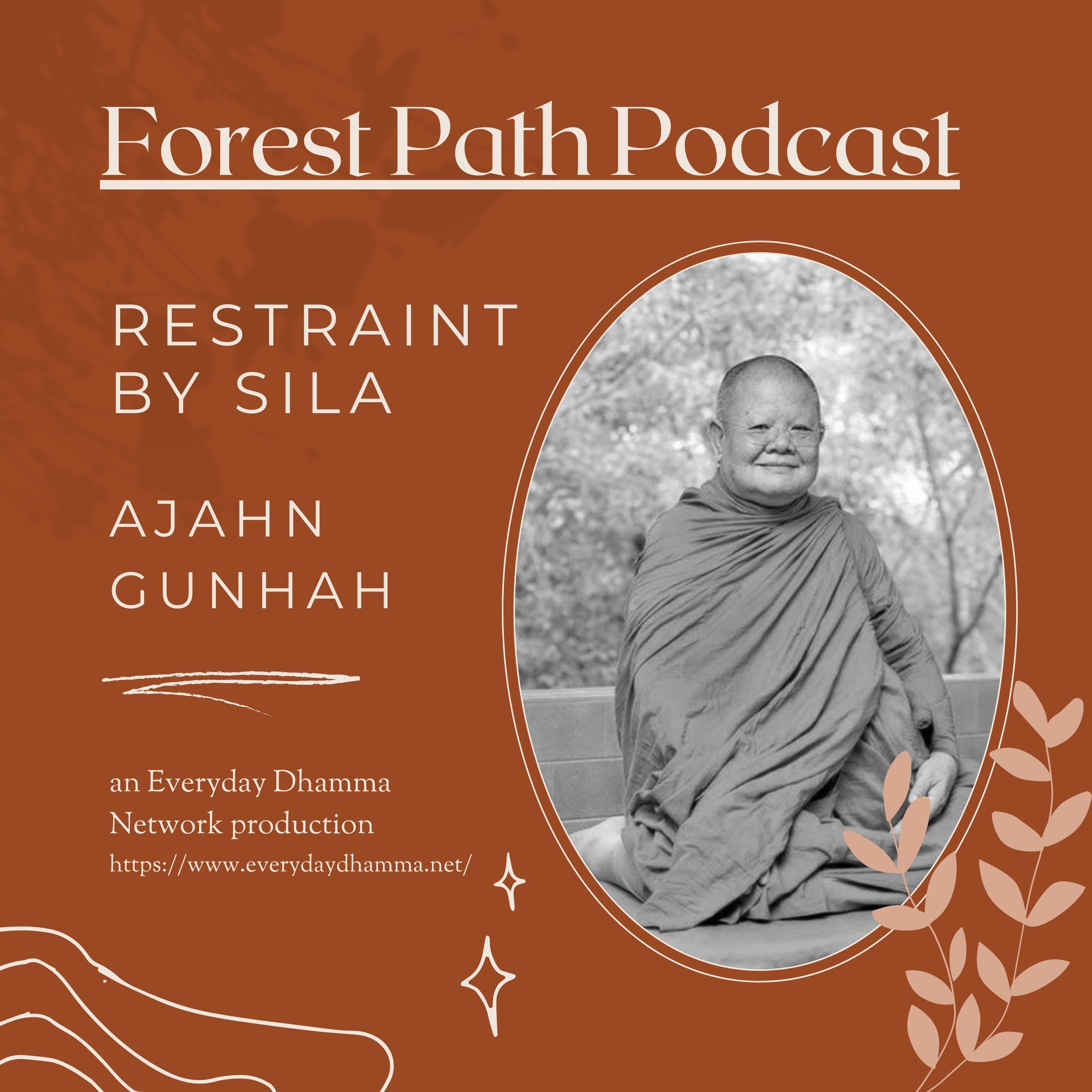Episode Transcript
Sati Protects the Citta
by Ajahn Tate
Focus your attention on the Citta.
When we practise meditation, we rely on Sati. Sati is important. Consistently focus mindfulness on the Citta. Confine your attention to the Citta.
When you see the Citta, focus your attention there and then you will understand what this desana10 is about. This Citta is the only thing that you need to take care of. Nothing else matters!
The Citta is superior to the sense organs and every part of the body. It rushes about all over the place and delivers anxiety, worry, pain and suffering. This is all because of the Citta. If we take care of the Citta and have it behave with propriety, it will see the suffering and white-hot trouble that it brings and, when we do, these things will cease. Happiness will be achieved.
In so much as we do not understand the Citta, not having Sati there to protect it, the Citta flits from one form of suffering to another. It stays in this state until it understands what’s going on. When it does understand what is happening, happiness follows. At present, it does not have a clue as to what is going on, so it continues to flit about. This is why the Citta is our number one priority for care and protection. Every aspect of meditation converges on this single spot, the Citta. So, you only have one thing to take care of. I want you to earnestly and sincerely protect your Citta.
Right now, we are going to sit in meditation and listen to a desana. We are going to take control of the Citta and place it in a cocoon of Sati. Sati is the one that watches over the Citta. When the Citta rests in the cocoon of Sati, job done.
Sati is the one who continually protects and cares for the Citta. Sati is mindfulness. The Citta is the one who thinks, who ruminates, who flits about. In these circumstances, this is how we define Sati. If there was no Citta, there would be no Sati. If there was no Sati, there would be no Citta. In truth, they are one and the same but they exhibit different characteristics. They have different functions.
Sati is like a nursemaid. The Citta is like a toddler. Sati looks after the Citta all the time. The nursemaid has to be watchful of the naughty child, else it may get into trouble or fall and hurt itself. Whatever happens, one must maintain Sati. The nursemaid must be ever-present! Before the toddler can face danger, a little time must be spent raising the child. Several years may pass as the child grows up. When some maturity has been reached, there are other things to look out for, such as being mischievous and playing around all the time. One must guard against these things. This is necessary because you are still dealing with a child. Caution must be exercised at all times as the child develops through teenage years and onwards. When it misbehaves badly, Sati must be applied constantly, until the child is grown up. Sati must be aware from the very first thought right through to the flitting around and the chasing down of every possible avenue for suffering. Sati must provide non-stop protection.
As far as the child is concerned, it has a physical body and when we cocoon the Citta (with Sati) it’s like it too has a body. It becomes clear to see. Whether the Citta is at home or away or running around all over the place, all becomes crystal clear. It really does seem to have an embodiment.
When we look after the Citta and cocoon it with Sati firmly established, it will converge into a single spot11, the Heart. That is to say, it will be centred12. Then, it has no whereabouts. Wherever this singularity is encountered, that is where the Heart is, right there. It is neither inside or outside, above or below. The Heart is centred. Where is it? Right in the middle.
Train Sati to cocoon the Citta so that it consistently reaches the singularity. Then it will gradually obtain the strength and ability to investigate various things. It will be able to overcome and extinguish all manner of suffering. There is no possibility that inflamed passion or anxiety could arise.
Right now, we are not centred and so we cannot let go of suffering. Suffering is anxiety, trouble and strife. In our state of delusion, happiness is seen as pleasure, but this doesn’t lead to the singularity, ever.
When you have reached the singularity, whatever suffering is, you will know as suffering. You will be able to cast aside suffering. You won’t be fooled by happiness and pleasure won’t intoxicate you. You will be centred. You won’t be happy or discontent or confused. You won’t suffer.
Sati is one thing. The Citta is one thing. Sati cocoons the Citta. When they come together in this way, they become the Heart, singular. There is nothing more important than the Heart. The Citta breaks out from the Heart. If there is no Heart, there is no Citta. Wherever there is a Citta, there is a Heart. Wherever the Heart is, that’s where the Citta is. This is where you will find them. To all intents and purposes, they are defined in the same way.
So, why did the Lord Buddha call it the Heart? Why did He call it the Citta? He explained that the Heart is a singularity that does not go flitting about. It has no evil or unwholesome thoughts. It does not think about merit or anything else for that matter. The Heart is centred and that’s it. It has nothing. It does not think. It does not rationalise. It does not invent. It does not embellish. Because of this, it does not give rise to Paññā (wisdom). Put this aside for a moment and stick with being centred. Paññā arising or not arising, is not the point. Before you reach the point of singularity, you have to use an enormous amount of Paññā. You must investigate every aspect of every (worldly) theme13 with all the force that you can muster. At this stage Paññā has been used extensively. When every avenue has been exhaustively investigated, the singularity is entered. People think that this singularity has no Paññā but, in reality, Paññā has been used extensively in order to get there. When centred, there is no activity.
If you want to get a feel for what it is like to be centred, just try this exercise. Give it a go. Hold your breath for just a second. There’s no activity. There is stillness and an awareness of the stillness. There’s no thinking or pondering but there is an awareness that there is no thinking. There is no flitting about, going backwards and forwards. There is no consideration of what is wholesome and what is unwholesome at all. The one aware of the stillness, that is the singularity, that is the Heart14. But it’s only momentarily there, as we hold our breath.
When you latch onto this, you will be able to say, this is the Heart.
The time comes when this state breaks up. It becomes the Citta when it starts staggering about, thinking. Sati still envelops and tends to the Citta. The emphasis is then on washing away all unwholesome states; relinquishing phenomena that lead to poor karmic results. That which is meritorious and virtuous must also be abandoned. Merit is no longer wanted. Unwholesomeness is not wanted. This allows you to reach the singularity (again). If you still hold on to merit, you won’t become centred. If you want for unwholesome states, then you won’t become centred. It is when you give up both of these conditions that you become centred. So, exercise Paññā extensively and develop skilful ways of investigation until you reach the Heart.
It is natural for the Heart and the Citta to engage with each other. The Citta enters the state that is the Heart but stays for only a short time and then it is off again. It’s off busying itself with things, as is its want. But if we have Sati firmly established and aware of what is the Heart and what is the Citta, when the Citta is naughty, chasing after various objects, we will comprehend what is happening. Comprehending here means to abandon whatever is no good. When you get rid of all that is no good, you revert to being centred again.
When you practise Samādhi Bhavanā (meditation), if you practise in this manner often and consistently, you won’t get exhausted racing off after the Citta which has no rest station, no break. Racing around does not work. Explore until all avenues of investigation have been exhausted. If you get this right, you will be back for more, back to the Heart. If you get this wrong, you will be running flat out in a gigantic way.
No matter what, I want you to understand what it means to consistently reach the Heart. Achieving the peace and quiet associated with being at one is the best kind of work. Even if there is no Paññā, take whatever you can get. Accept this for the time being. Accept the peace and quiet. If you are steadfast in your practise, these things will happen by themselves.
Have no fear. Don’t be afraid that the Citta will stop thinking. Don’t be afraid your imagination will be gone. Thinking, pondering and imagining, your understanding will keep pace with them if you have been able to reach the Heart. This is the kind of work you have to put in to train in meditation. It doesn’t matter whether it is Ānāpānasati (meditation on the breath), Maraņasati (meditation on death), or Buddho (repetition of a mantra), or whatever meditation subject you use, their purpose is to take you to the Heart. Their purpose is to develop the protection of Sati. If you cannot have Sati protect the Heart, or if the protection isn’t fixed, it does not matter what else happens, it will be completely useless.
We only have one Citta associated with this body, and it is the most important thing there is. Everyone across the world is the same, each with their own Citta. This is where all the turmoil comes from. If everyone looked after their own Citta, there wouldn’t be any turmoil. There would be nothing but contentment. If everyone cared for their own Citta and had Sati protect it, this would be sufficient. The reason for turmoil, confusion and entanglement is a lack of understanding of our own Heart. When none of us can take care of our Heart, there is greed and animosity, cutting through everything. All this arises from the Heart15. Just the Heart.
So, what has the Heart got? Does Lobha (greed) creep into the Heart. How could Lobha get there? Where does Dosa (anger) come into things? Does this reside in the Heart? Is there Moha (delusion) in the Heart? I don’t see where there is a storage place for these in the Heart. I don’t see the Heart as having substance. So, what has it got? The Heart is a void. It is empty. It has no substance.
People think (Lobha, Dosa and Moha) are good things but what is good about them? Anger, greed, delusion, people think themselves wonderful because of having these traits. They consider themselves to be good people. But what is good about them? How can they be wonderful? All they have are troubles and strife.
For example, our possessions. Lobha makes us greedy for them. What is that all about? You want to eat, consume or use them. And what is it that makes use of these possessions? It is this body, which gets large, fat and obese, isn’t it? You don’t see a problem with that, but old people are decaying by the day.
The same is true for Dosa and Māna (conceit, pride). False views arise but you think they are the real thing. You believe there is a “self”, a “me” a “them” in corporeality. Mānaditthi (conceited false views) having arisen are held onto stubbornly. What is this about? You don’t see a problem with this? Does this corporeal body not grow and expand? Is it now16 better, more special than the old one? Is it younger and prettier than the old one? Or what’s the deal if the body is not more beautiful? If all you have is a sullen look, a disfigured face or the countenance of a demon or the devil, isn’t it better just to live a good life?
Moha, delusion, is no different. Before Lobha can arise, there has to be Moha, delusion. After Moha appears greed, animosity and misunderstanding occur. I implore you to investigate and see this for yourself. When you have managed to achieve this, job done.
Moha, Dosa and Mānaditthi will cease. There will be a void, empty of anything. You dwell indifferent to everything. Isn’t this better?
Get to the Heart, the singularity. You will be happy, in good health and nothing will threaten you. There will be no inconvenience wherever you go. You won’t be attached to the world. People with Dosa and Mānaditthi are completely attached. They won’t give in and will be troubled wherever they go.
I implore you to investigate in this manner. If you examine things in the right way, this way, (your Citta) will converge and become the Heart.
That’s it for now. Investigate in this way!




